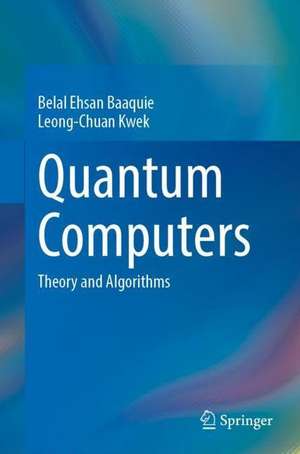Quantum Computers: Theory and Algorithms
Autor Belal Ehsan Baaquie, Leong-Chuan Kweken Limba Engleză Hardback – 4 ian 2023
| Toate formatele și edițiile | Preț | Express |
|---|---|---|
| Paperback (1) | 584.92 lei 6-8 săpt. | |
| Springer Nature Singapore – 5 ian 2024 | 584.92 lei 6-8 săpt. | |
| Hardback (1) | 788.09 lei 6-8 săpt. | |
| Springer Nature Singapore – 4 ian 2023 | 788.09 lei 6-8 săpt. |
Preț: 788.09 lei
Preț vechi: 961.09 lei
-18% Nou
Puncte Express: 1182
Preț estimativ în valută:
150.87€ • 157.42$ • 126.47£
150.87€ • 157.42$ • 126.47£
Carte tipărită la comandă
Livrare economică 12-26 martie
Preluare comenzi: 021 569.72.76
Specificații
ISBN-13: 9789811975165
ISBN-10: 9811975167
Pagini: 297
Ilustrații: XVI, 297 p. 81 illus., 44 illus. in color.
Dimensiuni: 155 x 235 x 24 mm
Greutate: 0.62 kg
Ediția:1st ed. 2023
Editura: Springer Nature Singapore
Colecția Springer
Locul publicării:Singapore, Singapore
ISBN-10: 9811975167
Pagini: 297
Ilustrații: XVI, 297 p. 81 illus., 44 illus. in color.
Dimensiuni: 155 x 235 x 24 mm
Greutate: 0.62 kg
Ediția:1st ed. 2023
Editura: Springer Nature Singapore
Colecția Springer
Locul publicării:Singapore, Singapore
Cuprins
Introduction.- Fundamentals.- Binary Numbers, Vectors, Matrices, Tensor Products.- Classical Gates and Algorithms.- Principles of Quantum Mechanics.- Quantum Superposition and Entanglement.- Binary Degrees of Freedom and Qubits.- Quantum Gates and Circuits.- Phase Estimation and quantum Fourier Transform (qFT).- Quantum Algorithms.- Deutsch Algorithm.- Deutsch-Josza Algorithm.- Grover’s Algorithm.- Simon’s Algorithm.- Shor’s Algorithm.- Applications.- Quantum Algorithm for Option Pricing.- Solving Linear Equations.- Quantum-Classical Hybrid Algorithms.- Quantum Error Correction.- One-Way Quantum Computer.- Summary.- Efficiency of a Quantum Computer.
Notă biografică
Prof. Belal Ehsan Baaquie holds a B.S. in Physics from Caltech and a Ph.D. in Theoretical Physics from Cornell University, USA. His main research interest is in the study and application of the mathematical methods of quantum field theory. He has applied the mathematical formalism of field theory to finance and been a major contributor to the emerging field of quantum finance. His current focus is on developing the formalism of quantum finance and applying it to option pricing, corporate coupon bonds, and the theory of interest rates, as well as the study of equity, foreign exchange, and commodities; he has developed forecasting models for commodity prices. He is also applying methodologies from statistical mechanics and quantum field theory to the study of microeconomics and macroeconomics.
Leong-Chuan Kwek is a principal investigator at the Center for Quantum Technologies, NUS, the Co-Director of the Quantum Science and Engineering Center at NTU and a faculty of the National Institute of Education, Singapore. He is the Immediate Past President of the Institute of Physics, Singapore and a Council Member of the Association of Asia Pacific Physical Socieites. He is also an elected Fellow of the American Associaiton for the Advancement of Science (AAAS) and the Institute of Physics, UK (IOP).
Leong-Chuan Kwek is a principal investigator at the Center for Quantum Technologies, NUS, the Co-Director of the Quantum Science and Engineering Center at NTU and a faculty of the National Institute of Education, Singapore. He is the Immediate Past President of the Institute of Physics, Singapore and a Council Member of the Association of Asia Pacific Physical Socieites. He is also an elected Fellow of the American Associaiton for the Advancement of Science (AAAS) and the Institute of Physics, UK (IOP).
Textul de pe ultima copertă
This book presents various theories and algorithms to create a quantum computer. The concept of the classical and quantum computers, and the concept of circuits and gates are reviewed. The example of the Deutsch and the Deutsch-Josca algorithm is discussed to illustrate some key features of quantum computing. The Grover algorithm, considered to be of major milestone of the subject, is discussed in detail to exemplify the techniques used in computer algorithms. The role of quantum superposition (also called quantum parallelism) and of quantum entanglement is discussed in order to understand the key advantages of a quantum over a classical computer.
Caracteristici
Highlights the advantages of a quantum over a classical computer Reviews the concepts of the classical and quantum computers along with circuits and gates Uses the Deutsch, Grover, and Shor algorithms for highlighting key features of quantum computing
